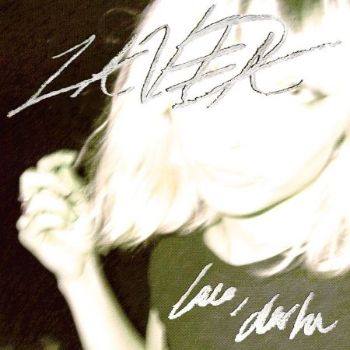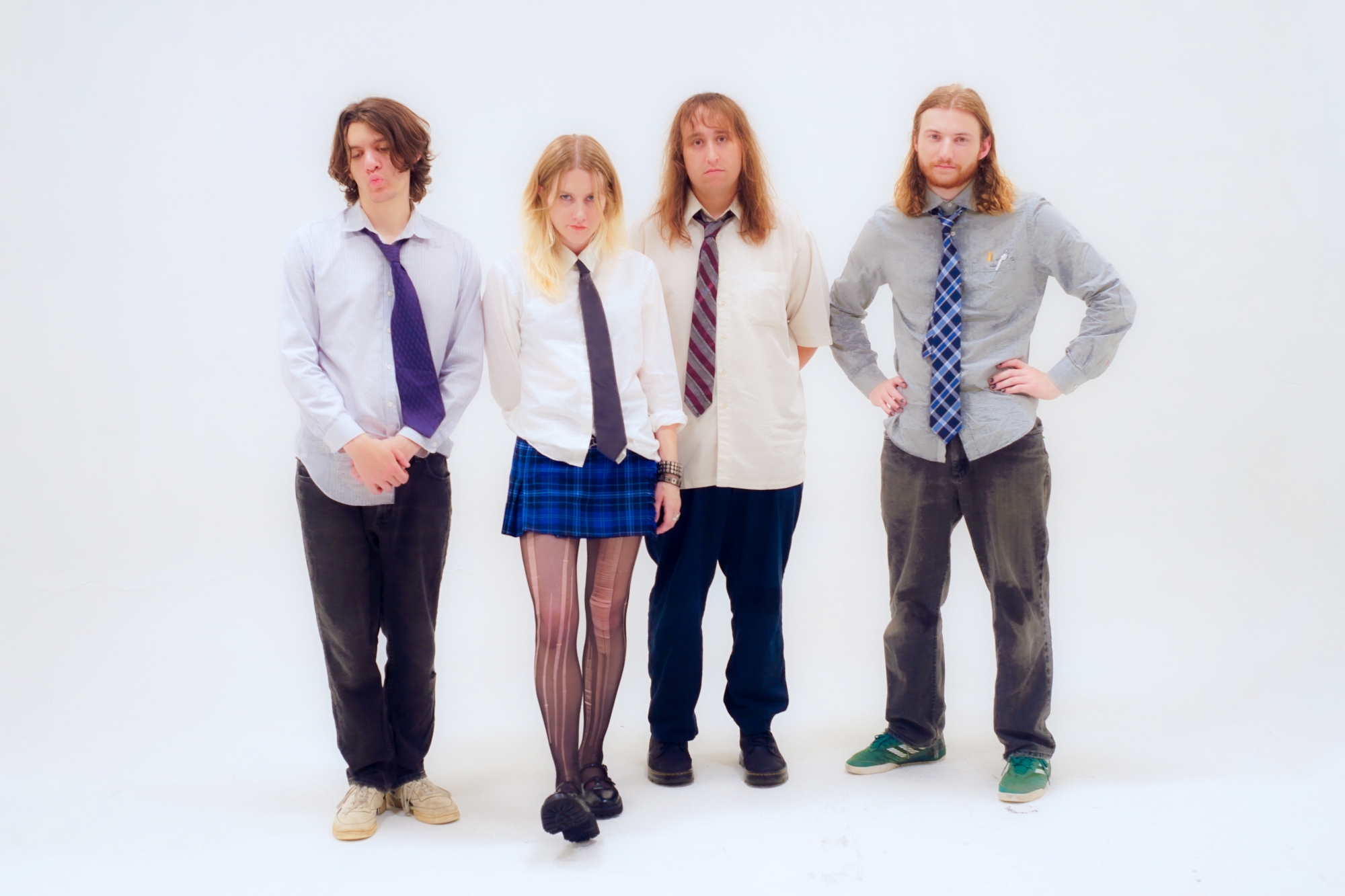Ali Genevich grew up in Albany, New York, and began playing in school bands as a teen. “I think Upstate New York is a lot smaller, there’s a lot of hardcore music, and I feel like that genre has always been popular,” laughs Ali when describing the music scene she grew up in to Post-Burnout.
“And Albany, specifically, I think is built on a pretty predominantly hardcore scene, but then there’s indie bands and all different kinds of bands that do kind of pop out of the scene. I went to school at The College of Saint Rose in Albany, and I think there being a music industry programme there brought a lot of kids in bands from out-of-state that were just writing original music, so there was more variety in the scene.
“But I think the energy in Albany is an ebb and flow; like, sometimes there’s a lot of really cool bands there, then you’ll hit these dry spells, where there’s nobody good anymore, but it usually bounces back. Then New York [City] is a whole different beast.
“I’ve heard people say similar things about New York, but I think it’s just on a much grander scale. Here, there’s just everything, and you can choose what you want to tap into, which is amazing for people who want it to be their whole life and everything. [Laughs]”
One of the people she met through her school bands was the musician Jacob Brooks. “I think that everything she gets into, she shows me,” Jacob says of their tastes and how they work together. “I’m pretty chill; I’m just hopping. I’m pretty chill with music, especially since moving down here [to New York City]. I like to work a lot, so I don’t really listen to music a lot, recently. [Laughs]”
Constantly changing tastes and a laid-back attitude to what they heard were a foundation for the two’s collaboration. After high school, they formed a new project, called Laveda (named after Jacob’s grandmother), which took textures from shoegaze and layered them over a dream-rock soundscape. In 2018, they began releasing their work as singles, which was to accumulate in their debut album, What Happens After, in 2020.
Unfortunately, what happened after was the COVID-19 pandemic. Now out of live opportunities, Laveda had to rely on selling their music remotely, which had a silver lining, as when they were able to play, they already had material out to prove their merit.
“I think it definitely helped us, for sure,” Ali says. “It helped with other bands reaching out to us and asking if we wanted to hop on shows. For us, we were also able to book our own headlining shows. It definitely helped us break into the New York City scene. Were we even playing here, even before the pandemic?” “A little, but not really,” clarifies Jacob.

Courtesy of Reybee, Inc.
Their belief in their music helped keep them afloat. “We were so excited about the music at the time, so it didn’t…you know, we were obviously bummed out that we couldn’t tour or play live shows, but it didn’t, like, kill our spirits entirely,” Ali remembers of that time.
“But, yeah, I think, at the same time, had that not occurred, things would’ve been a lot different. I’m not sure, I guess. But, yeah, there was a lot of pressure on the next record to make up for lost time, and really try to go places we’ve never been, and just try and reach new lengths with our music and audience.”
For their next album, 2023’s A Place You Grew Up In, Laveda expanded into a four-piece, with Dan Carr joining on bass and Joe Taroune joining on drums. Around the time of its release, Ali and Jacob moved from Albany to New York City. Dan moved to NYC during the summer, while Joe remains in Albany.
Now a band with experience playing across the U.S. and Canada, Laveda has become associated with a relaxed and ethereal sound to their fans, but all of that changed when they began crafting their follow-up to A Place You Grew Up In. Now, their sound became more abrasive and took influence from the harsh urban dins they encountered on a daily basis.
“I think it was intentional, but I think it really came from the band playing songs live together,” Ali says of their sonic shift. “We had some demos made, and they didn’t really sound a lot different, at least at the beginning, from some of our older material. I think there was a direction we were going towards, but, for me, anytime I’m influenced by something, it just feels very subconscious; it doesn’t feel like, ‘Oh, I want to sound like this band. I’m trying to do this thing that’s been done.’”
This new direction was driven in part by what the band were beginning to enjoy performing live, but also, in part, by a feeling about the world that Ali wanted to capture in her art. “I mean, they’re each definitely their own song, but I think there is an overarching theme of…[Laughs] My friends would say, ‘There’s kind of a theme of limerence-y throughout the record.’
“But I think that’s very broad, and certain songs don’t have that sort of aura, but I think, in general, it’s kind of an angry record. [Laughs] There’s just so much going on over here. [Laughs] So much to be mad about! So, you have that as the foundation, and you have your own personal shit and your own struggles, that may or may not have a lot to do with what else is going on in the political climate.”
So, earlier in the year, the band travelled to Uniform Recording in Philadelphia to document their new ideas. They worked with engineers Scoop Dardaris (Wednesday, Chase Petra) and Jeff Zeigler (The War on Drugs, Kurt Vile) to bring their vision to life. Released last Friday, the result was their third album, Love, Darla.
When it came to the production, the band wanted to focus on organically crafting the cold, civic atmosphere through their instruments. “Everything that we did for this album, at least, we wanted to be able to do it at least as a four-piece band,” Jacob explains. “For our previous two records, we would play to tracks, so we were a little bit more liberal with what we would allow to enter a song.” “In my mind, it was just, ‘Give the song whatever it needs,’” laughs Ali. “‘Just keep stacking things on top!’”
This album also marks the band’s first release with the long-running indie label Bar/None Records, who have released material by the likes of They Might Be Giants, of Montreal, Yo La Tengo, Juliana Hatfield, Alex Chilton, the dBs, Evan Dando, Luka Bloom, and many more over its nearly four decades of existence.
“They had been following us for a little while, like since we put our second record out,” Ali says of how they ended up on Bar/None. “Emmy [Black, the Head of Label and A&R] and Mark [Lipsitz, the former CEO], actually… – rest in peace, Mark – …came and saw us play a show, and we just chatted and had coffee a couple of times, and they were like, ‘We really love the new record.’
“Emmy was like…[Laughs]…listening to ‘Cellphone’ all the time, and she was like, ‘I can’t stop playing this song!’ So, that made us feel really good, and they’ve been really, really awesome. So, yeah.
“Really sad about Mark. He just passed away two months ago, after our first single. So, we had just barely gotten to know him, but he’s, obviously, been with the label for a very long time, so it’s very upsetting that he is not with us anymore, but, that being said, I think the label is going to continue doing really awesome things, and we’re very happy that they like our record!”
Laveda’s new record, Love, Darla, is out now. You can keep up with the band through Instagram, Facebook, and Twitter.
Tune into POSTBURNOUT.COM Interviews… tonight at 21:00 (IST) to hear this interview in full. Available on YouTube, Spotify, Apple Podcasts, and Amazon Music Podcasts.

Aaron Kavanagh is the Founder and Editor-in-Chief of Post-Burnout. His writing can also be found in the Irish Daily Star, Buzz.ie, Totally Dublin, The GOO, Headstuff, New Noise Magazine, XS Noize, DSCVRD and more.

 POST-BURNOUT
POST-BURNOUT